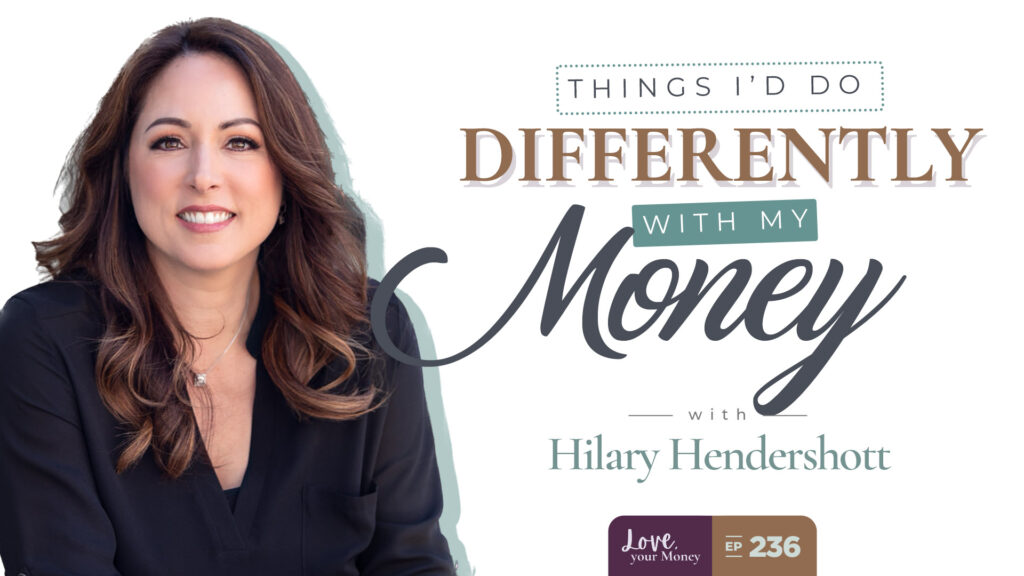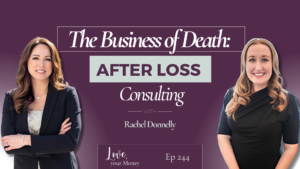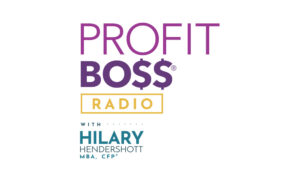Welcome to episode 236 of Love, your Money! In this episode, I’m going to get a little vulnerable with all of you, look back on my financial mistakes and talk about 5 things I’d do differently knowing what I know now.
At one point in your life, you’ve likely found yourself saying, “If I only knew then what I know now.” Or maybe you’ve already thought about what you would tell your younger self if you had the chance. Nobody’s perfect, and making mistakes is a part of life. The key is to learn from them to avoid repeating them.
So today, I’m going to run through some pivotal and unforgettable money decisions that I’d definitely do differently now if I could. I’ll also explain some of the warning signs that I foolishly chose to ignore so that you can make better financial decisions to build wealth and a better life instead of digging a giant hole to crawl out of. If I can do it, so can you!
Here’s what you’ll find out in this week’s episode of Love, your Money:
- Being rich or successful isn’t just being lucky
- The exponential value of building your savings muscles early
- How to create money boundaries for yourself
- Avoid get rich quick schemes aka “snake oil”
- Choose a career that suits your strengths
Inspiring Quotes
“I would save consistently, even though the numbers are small to begin with. If I could go back, I would really build that savings muscle earlier.”
– Hilary Hendershott
“Another thing I would do differently is I would have better money boundaries. I would give myself permission to say no.”
– Hilary Hendershott
Resources and Related to Love, your Money Content
Enjoy the Show?
- Be sure to subscribe to Money Love Notes so that you get our latest announcements, offers, articles, and resources straight to your inbox!
- Don’t miss an episode, subscribe via Apple Podcasts, Spotify, Google Podcasts, Overcast, or wherever you listen!
- Leave us a review on Apple Podcasts and share the show with your friends.
- Don’t miss out on the 7 Steps to Wealth Audio Guide! It’s free and comes with weekly emails that walk you through each step.
Transcript
Hilary Hendershott: Well, hello, money lover, many of you have heard the story of my financial failure, and I recently had a smart and curious listener point out that I might tell the opposite side of that story, that I could look back on my financial decisions and talk about what I would do differently knowing what I know now. So, let me just say that I don’t live with a lot of regret. I’m pretty happy with where I ended up, and for the most part, I do think that without all the mistakes, I never could have ended up just exactly where I am now.
But it’s been a really interesting exercise to look back from a different perspective and think about the places I did go wrong and what I would do differently now, and of course, what I’m doing differently now. So, the number one and the most important thing I would do differently is I would believe in myself and I would allow myself to experience the confidence and optimism of knowing that something can be achieved before it’s achieved. From the very beginning, I was so willing to stop believing in financial possibilities for myself. I mean, when I was a kid, heard a grown-up say something that I took to mean, I was going to be poor for the rest of my life, and I just accepted it. I had internal conflict about it, though, because I was really clear I wanted to build wealth and experience financial freedom, but I was in this self-created cage about it.
My primary belief was that I’d never earn or have enough money to be okay or happy or free, and it made me really frustrated. All I could see were reasons that it was real, but what I couldn’t see was that I had made up all those reasons in my mind. I’ve shared some of these things before, but among the crazy things I believed were rich people are either insiders or they’re just lucky. And I’m neither of those things. For example, when I moved to San Francisco for my first job out of college, granted only making $42,000 a year as a management consultant, everyone I worked with had some kind of deal on their apartment, like my coworkers.
San Francisco has rent control, and there are these huge dichotomies because of it. So, you either get a rent control deal because someone finally gave up their rent control apartment and handed it to you, or you pay full price. So, I thought the people who got the rent control deals were either insiders, like they had cool friends that I didn’t have or that they were lucky. So, I didn’t ask. I didn’t search, I didn’t even try. And of course, at that level of starter income, rent was like half my monthly pay. Getting a rent control deal would have been great both for my financial and emotional life, but I didn’t do anything to find one.
Also, cars. I pretty much always had more car than I could afford, and I never ever saved money to buy my next car, so I always had to trade in and finance. I was a pretty aggressive driver, so I had a handful of expensive accidents. No bad injuries, not for me or anyone else. And then, of course, I had speeding tickets. And after the accidents, my car would be totaled and I didn’t have comprehensive insurance, so I’d be at the starting line with a $0 saved to buy another car. And where you live and the car you drive or how you pay for transportation are by far the biggest levers low and medium income folks can pull to ratchet up their net worth. So, to lower their expenses, which if you don’t spend the savings and you save it helps you with your net worth.
So, I set myself up at a disadvantage with both of these behavior patterns. The car problem culminated with the leased BMW convertible that I drove until I literally couldn’t afford to fill the tank with gas. And I’ve told this particular story many times because I literally walked home from the gas station, and eventually, I handed the BMW keys back to the credit union that owned it. I did that. I walked into their leasing and finance office. I put the keys on someone’s desk and I said to them, “Here’s your car back. I can’t afford to pay for it anymore, so I’m giving it back to you.” I mean, this lady didn’t even know what to say to me. I can’t quite remember how I got around right after I gave up that BMW, but I believe I paid $2,500 for a friend’s Ford Explorer, which my boyfriend at the time referred to as a bucket of bolts, and he was embarrassed to be seen in it. So, that was humbling.
The second thing I would do differently is I would save consistently, even though the numbers are small to begin with. If I could go back, I would really build that savings muscle earlier. I mean, you start with zero. We all start with zero. Unless someone gives you a bunch of money, everyone starts at zero. But if you save monthly, those numbers accumulate and grow. And that’s what I didn’t do.
In fact, at my first couple of jobs, I didn’t even contribute to the 401(k) because I told myself I didn’t have enough disposable income. If I could go back, I would have contributed at least $100 or something, just to get myself building wealth and to build that muscle and that mindset of expecting my net worth to increase over time. I had a brief job in corporate marketing at a Silicon Valley tech company, and there, I had a 401(k) that I did contribute to. When I left that job, I had maybe $5,000 saved in that account, but I ignored the letters they sent me asking me to take that account with me. It seemed complicated and overwhelming to understand how to get to that money. It’s embarrassing to tell you this, but it’s true. It happened.
Of course, I know now that you roll over your old 401(k)’s into IRAs. And I was completely unresponsive to their request that I do something with that account, and I eventually forfeited it. They have what’s called a forfeiture account. I know this now because I have literally managed other people’s company 401(k)’s, interesting turnabout. And my money went right into that slush fund. This again is me just manifesting that I’ll always be poor. And I would definitely do that differently if I could do it again. That $5,000 might be worth $25,000 or more right now if I had never touched it. I mean, it’s hard to think about the fact that I let that literally slip through my fingers.
Of course, one form of savings is saving for annual income taxes if you don’t have withholdings. And at that same corporate job, after I was W-2 for a while, they asked me to go 1099. And at that time, my hourly wage was massive compared to my former wage. The amount of money I was earning as a contractor was twice my income before, because they’re compensating you for all the benefits you don’t get when you’re a contractor. So, I was getting these huge checks, but of course, I didn’t save for taxes. So, I was in a massive upset come tax time. And if I could go back, I would save 40% to 50% of that check and force myself to right-size my lifestyle and live within my means.
The third thing I would do differently is I would have better money boundaries. I really just didn’t know how to say no. No, I’m not going to buy that. No, I’m not going to do that with you. No, I’m not paying for drinks tonight. It sounds simple, but it’s also very cultural. No, with no explanation or caveat or excuse, like, we have to say I can’t, I can’t. Just say no. No is sometimes considered rude. And I do think women suffer from that more so than men.
I remember the first year of my financial recovery, I told my 28-person extended family that I wasn’t buying any Christmas gifts. I did not spend any money. It was awkward and I still feel kind of bad about that. But it was also, in a strange way, empowering. I mean, I wish I had never been someone who had to say that to my family, but I did, and until that year, every single December 24th, I was at the mall miserable, spending $1,000 or more on gifts I felt obligated to give. And of course, every Christmas until that year put me in debt. So, then the year after I bought zero gifts, I saved every month, so I never had to do that again. But it’s just an example of a money boundary. Is that the right place to put your money boundary in, is Christmas with your family? I don’t know, but I mean, again, that was the first, I was like learning how to say no. I don’t have any money, I can’t spend on this.
The fourth thing I would do differently is I would follow the rules of money. And I was thinking about this. And I think another way to say this is I’d avoid the snake oil. I was really chasing snake oil. Here’s what I mean. The definition of snake oil is: it’s a term used to describe deceptive marketing, a health care fraud, or a scam. So, I’m not using this in the context of a health care fraud, but of course, it’s deceptive marketing. Like, think of this as get-rich-quick-type activities. I really wanted to skip over the being poor part and just get to the being rich part. I fell into one of the bad direct sales organizations. There are good ones, but this one was bad and I put thousands of dollars on a credit card to buy their startup kit that never turned into any income to me. I purchased an options trading course at a Tony Robbins event. I think I paid $7,000 for that, and of course, never earned a dollar. And of course, I’m always talking about how individual stock picking, including trading options and futures, is, in all likelihood, a big mistake.
And really, the worst thing I did, the worst kind of snake oil I drank was to buy real estate with only 5% down. I bought a condo I had no business owning. Back in the early aughts, real estate was having this big heyday, and they were just doing deal after deal. And I saw people owning real estate and I wanted in. Builders were offering stated income loans with only 5% down, which is not enough skin in the game. There is a reason 20% down is the going number, right? It’s mathematically proven. I got myself qualified for a loan anyway, though, and I bought. I mean, I couldn’t even afford to furnish the condo with furniture. So, if I could do that again, I would give myself the patience and prudence to keep renting, to save up a 20% down payment and qualify for a 30-year fixed-rate mortgage and buy that way, the way my husband and I did many years later. That’s following the rules of money. I pay my credit card balances off every month. I’d work hard to max out my retirement savings every year. All the things you hear people talk about that sound boring and slow and mainstream, those are the things that work. They really do. That’s following the rules of money.
So, the fifth and final thing I would do is I would have focused earlier on using my strongest skill sets to raise my income and make more money. You absolutely can get rich slowly on a medium or low income, right? You could save enough money on a low income to replace that low income, and live low income in retirement is possible. But of course, it’s easier if you can earn a higher and higher income. It’s totally possible to graduate from college having earned a really technical and valuable skill set, but most people acquire their skills over the course of their 20s, I think, right? So, if you didn’t get it in college, it’s not too late. I think I was a little bit too focused on finding a job that was fun. And I have fun in my work now. I love what I do, but I’m also very clearly focused on profit in my business. When I was looking for a fun job, I was distracted with that filter and I ended up doing a handful of things that were never going to be long term for me.
All right, there you have it. Those are the things I would do differently about money if I had it to do all over again. In summary, one- I would believe in myself and I would allow myself to experience the confidence and optimism of knowing that something can be achieved before it’s achieved. Two, I would save consistently, even though the numbers are small to begin with. If I could go back, I would become a saver. I would do the things I needed to do mentally, psychologically, systematically to build that savings muscle. The third thing I would do differently is I would have better money boundaries. I would give myself permission to say no. The fourth thing I would do differently is I would follow the rules of money and avoid the snake oil. And finally, the fifth thing I would do differently is I would have focused earlier on using technical and strong skill sets, my natural skill sets, plus learned skill sets to raise my income and make more money.
Well, money lover, I hope this has been useful. It was, again, an interesting exercise for me to go through and I’d love to hear from you. If this made a difference for you, just send us a quick email at hello@hendershottwealth.com.
Disclosure
Hendershott Wealth Management, LLC and Love, your Money do not make specific investment recommendations on Love, your Money or in any public media. Any specific mentions of funds or investments are strictly for illustrative purposes only and should not be taken as investment advice or acted upon by individual investors. The opinions expressed in this episode are those of Hilary Hendershott, CFP®, MBA.





